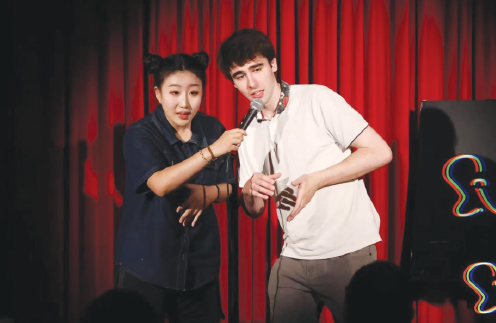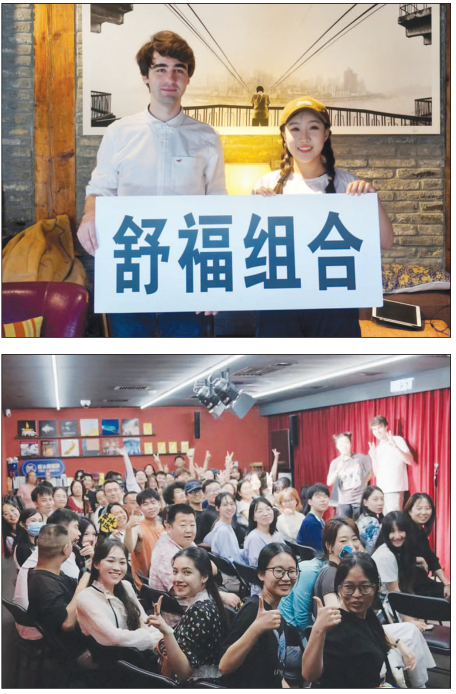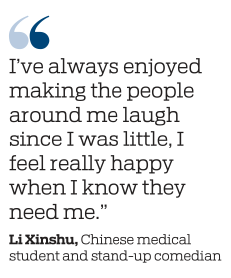Duo finds laughter is the best medicine

Chinese medical student and British comedian team up to put smiles on more faces, Hou Chenchen reports.
In a traditional courtyard dwelling in Beijing, an unexpected partnership was forming between a local graduate and a foreigner.
Chinese medical major Li Xinshu, 24, and British comedian Fraser Sampson, 27, were crafting their next stand-up comedy routine right in the heart of the Chinese capital.
Their partnership, dubbed "Shufu Duo", is a cross-cultural stand-up comedy act born last December.
Sampson, known on stage as A Fu, and Li, known as Little Shu, represent an unusual fusion of cultures and comedic traditions.
Their act diverges from the traditional Chinese cross-talk xiangsheng, embracing instead global and contemporary elements.
Sampson resides in a traditional Beijing siheyuan courtyard home surrounded by buildings on all four sides. Eastern and Western design elements converge on the site, mirroring the cross-cultural appeal of Shufu Duo's performances. The unique setting has become a creative sanctuary for the partners to hone their act.
Their resonance with audiences also reflects how stand-up comedy incorporating Western elements is carving out a niche in the country's entertainment scene.
"Unlike traditional comedy, stand-up involves direct engagement with the audience, creating a dynamic and often unpredictable comedic effect," Li said, noting that the interaction is a key feature that distinguishes stand-up from Chinese xiangsheng.
"While both forms depict everyday life with humor and satire, xiangsheng follows a more structured and generational approach, whereas stand-up thrives on spontaneity and contemporary relevance."
The journey of stand-up comedy in the Chinese mainland can be traced back to the 1970s and 1980s. It gained early traction in Hong Kong area with performers like Wong Tze Wah. By 1990, Wong's stand-up routines, known for their sharp social commentary, resonated with audiences and paved the way for the genre's expansion into the Chinese mainland.
The 2012 debut of a TV variety show series themed "Tonight 80's" further introduced stand-up comedy to audiences. Subsequent similar offerings, such as Tencent Video's Rock & Roast series, helped place it firmly in Chinese entertainment.
Home advantage
Fraser Sampson himself was raised in Beijing's traditional hutong alleyways and discovered his passion for comedy while thinking about how he could leverage his Chinese language skills post-graduation.
"I kept wondering how to use Chinese after graduating from university, and how to apply it in my work, and then I found comedy," he said.
Influenced by Canadian xiangsheng performer Da Shan, Sampson saw parallels between his cross-cultural background and Da Shan's successful integration of Western and Chinese comedic elements. In 2023, he transitioned into stand-up, aiming to bridge cultural divides through humor.
Sampson said he then met his perfect partner, Li Xinshu, who was working as a host for the Yinghe comedy group at that time.
"Bro, your chest hair is spurting out," Li said to him during their meeting in the stand-up comedy theater.
Looking back on that moment, Sampson said he found it "very abstract and quite humorous".
Li, who majored in Western medicine, began her comedy career after being discovered during an improvisation event.
"I've always enjoyed making the people around me laugh since I was little, I feel really happy when I know they need me," she said.
Sampson and Li said they value the collaborative nature of their work. Stand-up can be a solitary pursuit but having a partner offers essential support and shared creative input, he said.
Connecting people
His linguistic versatility — switching between US and British English and the Beijing dialect — also reflects their act's broader cultural adaptability. "When I was little, I spoke American English at school, and then switched to British English at home. I spoke the Beijing dialect with the nanny. The language kept switching, and so did my way of thinking," he said.
Sampson said he believes that stand-up, as an imported art form, offers Chinese audiences a rich cultural experience, albeit one that must be tailored to local sensibilities.
The duo's performances often address cultural misunderstandings and humorous anecdotes, easing the tension that might arise from language barriers. Their act not only entertains but also fosters a deeper appreciation of cultural differences, he said.
"Many people don't usually communicate with foreigners in English, so I noticed that when I'm on stage, the audience can somehow feel nervous. We use stand-up comedy techniques to release this tension, and it works very well," Sampson said.
Looking forward, the partners said they aspire "to further refine their craft, embark on a solo tour, and expand their influence through social media, and eventually perform on major stand-up comedy stages".
Sampson added that comedy audiences may experience significant stress in their lives, whether from work or family, and some might feel a bit depressed or unhappy. Comedy can bring joy to these groups, helping everyone loosen up.
"It is something our society really needs, and it's like a contribution we make to society," he said.
"Moreover, there's a saying in the UK, 'Comedy brings people together'. This is something that modern society truly needs."
Contact the writer at houchenchen@chinadaily.com.cn
























